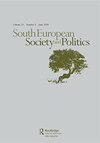西班牙的党内喜欢、党外不喜欢和投票倾向
IF 4.6
1区 社会学
Q1 POLITICAL SCIENCE
引用次数: 4
摘要
情感两极分化的人在选举日是投票还是呆在家里?尽管有越来越多的比较研究关注党派情感两极分化的起源,但我们对其对个人投票决定的影响的了解仍然有限。本文通过区分党内喜欢和党外不喜欢产生的投票倾向和党派情感两极分化之间的关系,进一步研究了投票倾向和党派情感两极分化之间的关系。结果表明,群体内喜欢情绪和群体外讨厌情绪都会增加人们的投票倾向,且后者的影响更为突出。以下几页提出的论点是基于对2019年4月至5月在西班牙进行的两波小组研究的分析。本文章由计算机程序翻译,如有差异,请以英文原文为准。
In-Party Like, Out-Party Dislike and Propensity to Vote in Spain
ABSTRACT Do affectively polarised people vote or stay home on election day? Although there is an increasing number of comparative studies focusing on the origins of partisan affective polarisation, our knowledge about its impact on individuals’ decision to vote is still limited. This article takes a closer look at the relationship between propensity to vote and partisan affective polarisation by distinguishing those produced by in-party like and by out-party dislike. The results show that both in-group like and out-group hate sentiments increase people’s propensity to vote, and that the effects of the latter are more accentuated. The argument presented in the following pages is based on the analysis of a two-wave panel study conducted in Spain between April and May 2019.
求助全文
通过发布文献求助,成功后即可免费获取论文全文。
去求助
来源期刊

South European Society and Politics
Multiple-
CiteScore
5.80
自引率
21.20%
发文量
14
期刊介绍:
A leading point of reference for scholars of Southern Europe, South European Society and Politics promotes both comparative and inter-disciplinary analyses, as well as offering innovative single county and sub-national studies. The journal acts as a forum for social, economic, cultural, contemporary historical and political approaches to research on the region, and is particularly keen to sponsor policy–focused studies in all these disciplines. The journal publishes research articles; South European Atlas with election reports and articles on other subjects of topical interest, and an extensive book reviews section, including both review articles and individual book reviews.
 求助内容:
求助内容: 应助结果提醒方式:
应助结果提醒方式:


